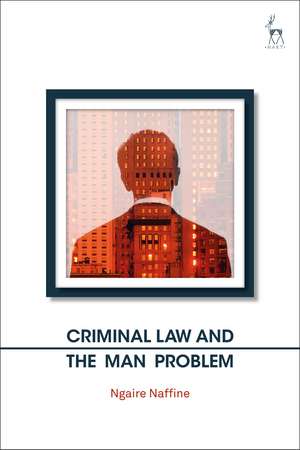Criminal Law and the Man Problem
Autor Ngaire Naffineen Limba Engleză Paperback – 18 noi 2020
| Toate formatele și edițiile | Preț | Express |
|---|---|---|
| Paperback (1) | 217.09 lei 6-8 săpt. | |
| Bloomsbury Publishing – 18 noi 2020 | 217.09 lei 6-8 săpt. | |
| Hardback (1) | 467.65 lei 6-8 săpt. | |
| Bloomsbury Publishing – 3 apr 2019 | 467.65 lei 6-8 săpt. |
Preț: 217.09 lei
Preț vechi: 274.58 lei
-21% Nou
Puncte Express: 326
Preț estimativ în valută:
41.54€ • 43.11$ • 34.72£
41.54€ • 43.11$ • 34.72£
Carte tipărită la comandă
Livrare economică 17-31 martie
Preluare comenzi: 021 569.72.76
Specificații
ISBN-13: 9781509945665
ISBN-10: 1509945660
Pagini: 224
Dimensiuni: 156 x 234 mm
Greutate: 0.32 kg
Editura: Bloomsbury Publishing
Colecția Hart Publishing
Locul publicării:London, United Kingdom
ISBN-10: 1509945660
Pagini: 224
Dimensiuni: 156 x 234 mm
Greutate: 0.32 kg
Editura: Bloomsbury Publishing
Colecția Hart Publishing
Locul publicării:London, United Kingdom
Caracteristici
A highly original monograph examining the role of men in shaping the criminal law, specifically through the law of rape and its main immunity within marriage, to the eventual dissolution of this immunity.
Notă biografică
Ngaire Naffine is Bonython Professor of Law at the University of Adelaide, Australia.
Cuprins
Chapter 1a IntroductionChapter 1 Problem Illustrated: The landmark marital rape case of DPP v Morgan and its mixed significance for the men of lawChapter 2 The Criminal World: The landmark marital rape case of DPP v Morgan and its mixed significance for the men of lawChapter 3 Hale, Blackstone and the Character of Men: The importance of personal border controlChapter 4 JS Mill, Stephen and the Victorian MentalityChapter 5 The Cast of Men: The Bounded Man, the Domestic Monarch and the Sexual MasterChapter 6 From Supremacy to Euphemism: Good Men Trapped in their Own AssumptionsChapter 7 Modernisation Or Men Assuming Responsibility without Taking ResponsibilityChapter 8 The Invisible Man: Why the men of law cannot see the men of lawChapter 9 The Modern Individual of Criminal LawChapter 10 Men, Women, and Civil Society: Male civility in the twenty first centuryChapter 11 Recapitulation
Recenzii
This ground-breaking and readable treatise belongs in every predominantly English law library in the world.
In this erudite and powerfully argued book, Ngaire Naffine adds to her already distinguished contributions to feminist legal scholarship with a trenchant critique of the persistent patriarchy of criminal law.
[A] hard-hitting, no-holds-barred critique of the pervasive maleness of criminal law, particularly, though far from exclusively, as it has operated, and continues to operate, in the sphere of sexual violence ... Naffine's book is a hugely significant achievement, likely to be devoured and debated, celebrated and critiqued, in equal measure. Most importantly, Criminal Law and the Man Problem issues a serious challenge, not just to criminal legal scholars but to legal scholars in general, to confront the continuing legacy of a deeply patriarchal past in the context of a discursive tradition in which history and authority have long been naturally aligned.
I found myself at times marvelling that, after decades of feminist work in this area, the point continues to need to be made that the criminal law and associated disciplines have a 'man problem'. However, on reflection, it seemed to me another plank in Naffine's argument that demonstrates both the deep-seated nature of law's masculine bias, and also the difficulty, as Naffine so eloquently argues, in making the 'men of law' recognise the problem. I can only hope that Naffine's challenge to the discipline is recognised and acted upon so that it can be an important step in confronting as well as analysing the 'man problem'.
This is an important book . that challenges many of the things that we take for granted about the criminal law.
A powerful and provocative addition to literatures of criminal legal history, gender and the law and critical approaches to criminal law. It can function as a valuable teaching tool.
In this erudite and powerfully argued book, Ngaire Naffine adds to her already distinguished contributions to feminist legal scholarship with a trenchant critique of the persistent patriarchy of criminal law.
[A] hard-hitting, no-holds-barred critique of the pervasive maleness of criminal law, particularly, though far from exclusively, as it has operated, and continues to operate, in the sphere of sexual violence ... Naffine's book is a hugely significant achievement, likely to be devoured and debated, celebrated and critiqued, in equal measure. Most importantly, Criminal Law and the Man Problem issues a serious challenge, not just to criminal legal scholars but to legal scholars in general, to confront the continuing legacy of a deeply patriarchal past in the context of a discursive tradition in which history and authority have long been naturally aligned.
I found myself at times marvelling that, after decades of feminist work in this area, the point continues to need to be made that the criminal law and associated disciplines have a 'man problem'. However, on reflection, it seemed to me another plank in Naffine's argument that demonstrates both the deep-seated nature of law's masculine bias, and also the difficulty, as Naffine so eloquently argues, in making the 'men of law' recognise the problem. I can only hope that Naffine's challenge to the discipline is recognised and acted upon so that it can be an important step in confronting as well as analysing the 'man problem'.
This is an important book . that challenges many of the things that we take for granted about the criminal law.
A powerful and provocative addition to literatures of criminal legal history, gender and the law and critical approaches to criminal law. It can function as a valuable teaching tool.
